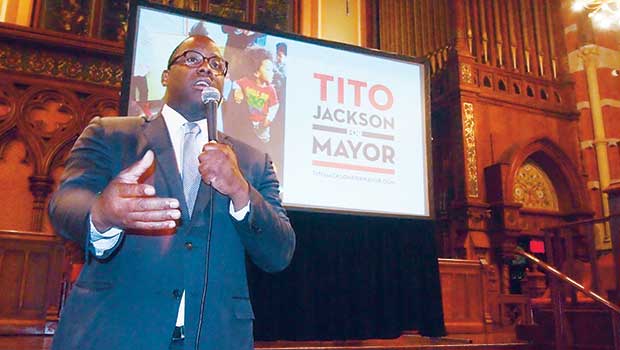Jackson outlines mayoral platform
Highlights Boston’s growing inequality

Tito Jackson outlined his mayoral campaign platform during a forum at the Old South Church last week, telling the audience that the Walsh administration has exacerbated the growing gulf between wealthy Bostonians and the middle class and hitting the mayor for backing business interests like General Electric over the needs of the city’s families.

District 7 City Councilor Tito Jackson says he would work to end inequality in Boston
if elected mayor.
“One of the most difficult things I faced in office was the night a helipad was proposed for General Electric,” Jackson said. “That same night I had to drive over to the Bolling Building, where they were closing the Mattahunt school.”
The pairing of the school closing and the generous tax incentives the city and state offered General Electric to move its headquarters to Boston have provided Jackson a convenient snapshot for what he says is an administration out of touch with the city’s needs.
Over the past two years, Jackson has hammered away at Walsh for a series of budget cuts — totaling more than $140 million — that have hit schools hard, winning him support among parents leery of Walsh’s agenda for the Boston Public Schools.
“What kind of a city are we if we can give $25 million in tax breaks to for-profit companies while we can’t fund education?” Jackson said at the forum.
Jackson’s criticism of the Walsh administration may have been a key factor in his winning the support of voters in Jamaica Plain’s traditionally progressive-voting wards 11 and 19. Along with Roxbury’s Ward 12, those wards were the only three of the 22 wards Jackson won. While Jackson seems intent on expanding that base of support, he may be facing a stiff headwind, with polls showing Walsh in the lead by a commanding 30 points.
Jackson has so far struggled to get his message out in an election season where media coverage has been somewhat scant. Walsh hasn’t helped, agreeing to just two debates — and those only after the September preliminary balloting.
Many of Jackson’s ideas aren’t new. He’s calling for the dismantling of the Boston Planning and Development Agency, which he says he would replace with an agency that focuses solely on planning. That idea was aired widely during the 2013 mayoral campaign. Jackson’s call for all housing built on city-owned land to be one-third affordable, one-third moderately affordable and one-third market-rate was first implemented in the South End during the 1980s under the Flynn administration.
Jackson also is calling for the city’s Inclusionary Development policy to nearly double the number of affordable units developers are required to build, from the current 13 percent to 25 percent — higher than Cambridge, which recently adopted a 20 percent benchmark.
But Jackson backs up his call for the policies with statistics showing that market-rate housing developed in Boston under the Walsh administration is affordable to only the top 20 percent of wage earners here. In a PowerPoint presentation at the forum in the Copley Square church, Jackson used data from the website RentCafe to show that families would need an income of $135,000 to afford the average two-bedroom apartment in Boston.
“We are not building a city that takes care of all its people,” Jackson told the audience, lambasting Walsh for pursuing the city’s bid to host the 2024 Olympics and an Indy Car race.
Jackson also said he would democratize city government, taking some power away from the mayor by restoring the elected school committee, among other measures.
In addition, Jackson criticized Walsh for an increase in violence in Boston under his watch, noting that there have been 168 shootings in Boston and 35 homicides as of August 30.
“There is a significant uptick in violence,” he said. “We have to roll up our sleeves and deal with it.”
Jackson said he would hire more police officers in order to reduce overtime spending; implement more aggressive outreach to young men involved in gun violence to offer alternatives; redeploy so-called Safe Streets teams of bicycle police; and implement body-worn cameras for police. He also voiced support of an independent, civilian-led board to investigate allegations of police misconduct.
Other initiatives Jackson said he would implement: a $15-an-hour minimum wage for Boston; the creation of 5,000 new youth summer jobs and 1,000 year-round jobs; and the implementation of a sanctuary schools program that would prevent federal immigration enforcement officers from entering BPS schools.
Many of his proposed policies, Jackson said, are aimed at one of the city’s most pressing problems: inequality.
“I am moving to change the structures that have created inequality in Boston,” he said.







